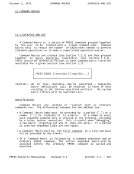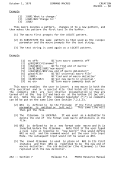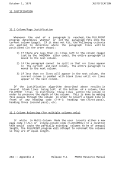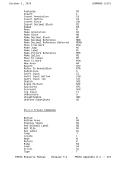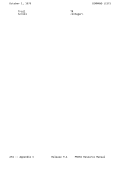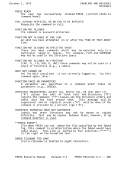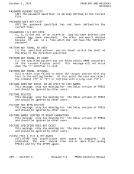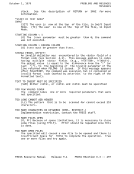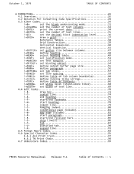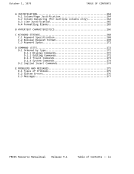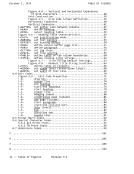October 1, 1979 COMMAND MACROS CREATION
MACROS -- $R
11.2.1.2 &READ ______________
This function can be used to prompt the user for required
parameters which are not specified initially and for which no
standard default can be used. An &R function inside a macro will
cause the character string enclosed in apostrophes to be printed
and a read to be done at the user's terminal (i.e., the terminal
will wait for a response). The string typed by the user will
replace the &R function in the macro expansion.
&R[<n>]['<prompt>']
or
&R<n>
<n>........A number from 1 to 9. If <prompt> is specified, the
line read in will substitute the &R function in the
command line.
• Any &R<n> may be redefined at any time by another
&R<n>'<prompt>'.
• If <prompt> is not specified, the last line read by
&R<n>'<prompt>' will substitute &R<n> in the command
line.
<prompt>...A line typed at the terminal before the read is done.
If null • ________, or if both <n> and <prompt> are not
a read will specified, no line will be typed, but ___________
still be done _____________.
Notes _____
• If the &R<n>'<prompt>' occurs as part of a default the &R<n> is
not defined unless the default is used. A null prompt may be
specified, for example, by &R1''.
• The definitions do not have to proceed in numerical order, that
is, &R2 may be defined and used even if &R1 is undefined.
• Both the <text string> and the input from the user are
considered literal text; no parameter substitution is done.
&R<n> must be defined before • An _______________________________ it is used or an expansion
error will occur and macro execution will terminate.
• &R<n> cannot itself take a default, but it can be included in a
default for a symbolic parameter (&<n>).
FRESS Resource Manual Release 9.1 FRESS RSection 7.2 -- 251
MACROS -- $R
11.2.1.2 &READ ______________
This function can be used to prompt the user for required
parameters which are not specified initially and for which no
standard default can be used. An &R function inside a macro will
cause the character string enclosed in apostrophes to be printed
and a read to be done at the user's terminal (i.e., the terminal
will wait for a response). The string typed by the user will
replace the &R function in the macro expansion.
&R[<n>]['<prompt>']
or
&R<n>
<n>........A number from 1 to 9. If <prompt> is specified, the
line read in will substitute the &R function in the
command line.
• Any &R<n> may be redefined at any time by another
&R<n>'<prompt>'.
• If <prompt> is not specified, the last line read by
&R<n>'<prompt>' will substitute &R<n> in the command
line.
<prompt>...A line typed at the terminal before the read is done.
If null • ________, or if both <n> and <prompt> are not
a read will specified, no line will be typed, but ___________
still be done _____________.
Notes _____
• If the &R<n>'<prompt>' occurs as part of a default the &R<n> is
not defined unless the default is used. A null prompt may be
specified, for example, by &R1''.
• The definitions do not have to proceed in numerical order, that
is, &R2 may be defined and used even if &R1 is undefined.
• Both the <text string> and the input from the user are
considered literal text; no parameter substitution is done.
&R<n> must be defined before • An _______________________________ it is used or an expansion
error will occur and macro execution will terminate.
• &R<n> cannot itself take a default, but it can be included in a
default for a symbolic parameter (&<n>).
FRESS Resource Manual Release 9.1 FRESS RSection 7.2 -- 251



























































































































































































































































































